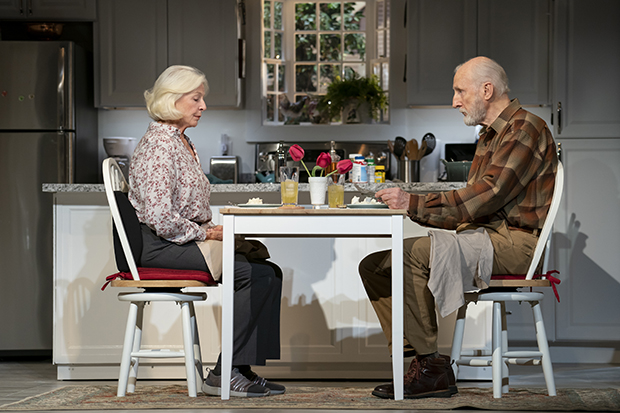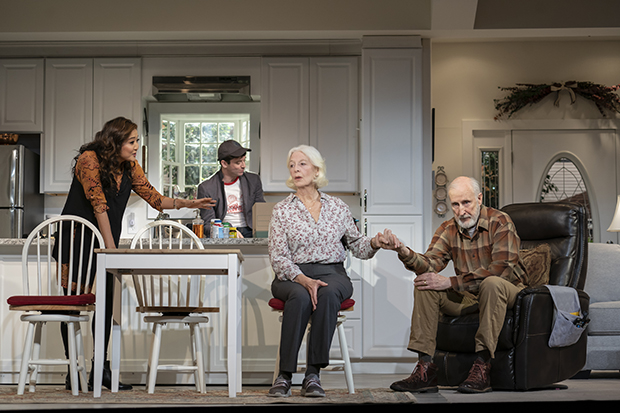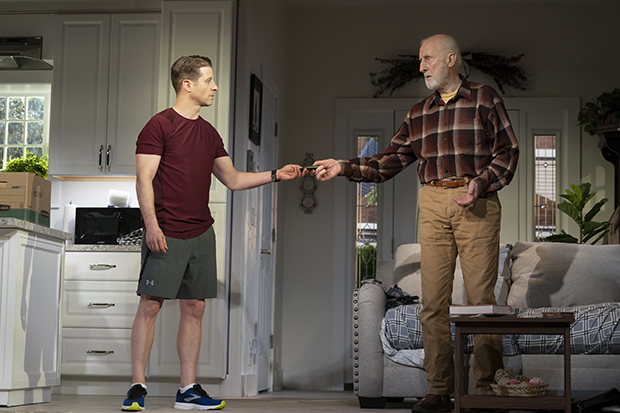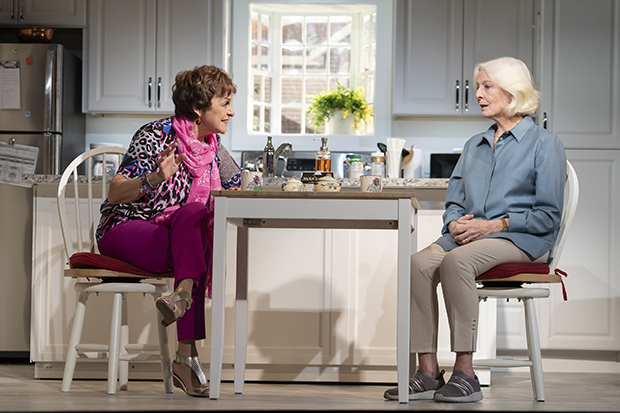Grand Horizons Explores Divorce in Your Golden Years

(© Joan Marcus)
You're never too old to learn something, but what if the thing you learn is that the person you've been married to for 50 years is making you miserable? Nancy French (Jane Alexander) has an answer. After silently preparing dinner with her husband, Bill (James Cromwell), she sits down to silently consume the meal. But she suddenly breaks her silence by pleasantly stating, "I think I would like a divorce."
Bill mildly responds, "All right." This is the unassumingly electric first scene of Bess Wohl's Grand Horizons, now making its Broadway debut at Second Stage's Helen Hayes Theater. The play takes its name from the retirement community to which Nancy and Bill have recently relocated. Scenic designer Clint Ramos slyly suggests the awkwardness of this transition by stuffing a giant couch and recliner into the cozy living room of this cookie-cutter suburban row house. These items are clearly refugees from a much grander house and a much grander life, making the present look awfully cramped. Under these circumstances, the "grand horizons" seem to promise nothing but the great beyond. But Nancy, who runs a clothing drive, still has things she would like to accomplish and places she would like to visit — without Bill.

(© Joan Marcus)
"If you wanted to get divorced you should have done it after we went to college, like normal people," declares their oldest son Ben (Ben McKenzie). He thinks they're too old to navigate a split and he worries that he is going to have to pay for it in the end; also, Ben is about to become a father for the first time with his wife, Jess (Ashley Park). A therapist, Jess tries to get Nancy and Bill to talk about their feelings. Their younger son, Brian (Michael Urie), wishes she would butt out. A theater teacher, he's too consumed with the stress of producing a 200-actor production of The Crucible to think clearly about the possibility of his parents divorcing. All three of them seem to want to smooth things over quickly and get back to their lives.
Wohl's recent play Make Believe, about four children left to fend for themselves during an after-school playtime that lasts for several days, was a fairly straightforward tale of parental selfishness and its consequences. Employing the same knack for humor and heartbreak that she exhibited in that play (also produced by Second Stage), Wohl puts us in the shoes of a mom and dad fending off the unbridled selfishness of their adult children.

(© Joan Marcus)
In a performance radiating warmth and fortitude, Alexander makes Nancy's grievances seem eminently reasonable. And while Cromwell exudes the craggy solitude of a man who might just petrify in his La-Z-Boy, his artfully revealed softer side also makes Bill someone worth rooting for. Both of them have done exactly what was expected of them as upper-middle-class Americans. Now that there are no more kids at home, can't they just have a little bit of their own lives back?
Their children think not, but do they even have a say? McKenzie's Ben wallows in the self-pity of a generation sandwiched between the "silver tsunami" and the prospect of raising children to the expectations of today's waning middle class. Urie's comic timing is typically on point as the neurotic Brian. Park displays the frustration of an in-law who wants to look concerned, but really has better things to do with her time. In her gaze, we can sense a simmering fear that she is watching her future unfold before her eyes.
All of the performances are great: The very funny Maulik Pancholy makes an appearance as a young guy trying to avoid the quicksand of a taxing relationship, and Priscilla Lopez makes a giddy cameo as an older woman who has managed to dodge committed relationships her whole life.

(© Joan Marcus)
Leigh Silverman's directing emphasizes the performances without skimping on showmanship: Her first act finale rivals those of certain big-budget musicals. Ramos's memorable scenic design is a star of the show, but it is greatly improved by Jen Schriever's naturalistic lighting design and Palmer Hefferan's invasive sound (we hear the constant drone of a neighbor's television). Bryce Cutler's preshow projections show us why: Grand Horizons looks like a California suburb that was compressed into one of those travel vacuum bags. Appropriate for characters just pushing through life, Linda Cho's muted costumes emphasize utility over desire — all except for Lopez's outrageous old-lady getup.
Commendably, Grand Horizons is a rare new play about older folks that is not just about the looming threat of dementia and death. It takes the American pursuit of happiness seriously, without ignoring the serious consequences of this pursuit. Far from being pro-divorce propaganda, Grand Horizons makes it clear that there are plenty of reasons to stay in a relationship that doesn't fulfill all of your hopes and dreams — and really, such expectations are an awful lot to heap on one person. But with passion, wit, and seemingly limitless compassion, Wohl asserts that it is never too late to renegotiate terms.










